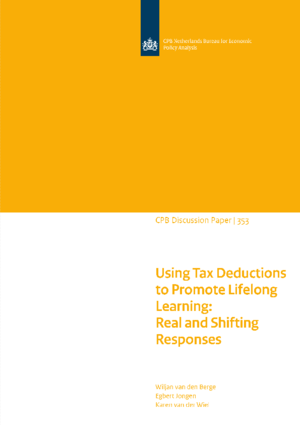June 13, 2017
Using Tax Deductions to Promote Lifelong Learning: Real and Shifting Responses
Policymakers are concerned about potential underinvestment in lifelong learning. In this paper we study to what extent a tax deduction helps to stimulate post-initial training. Speci
fically, we employ a regression kink and regression
discontinuity design as jumps in tax bracket rates generate exogenous variation in the effective costs of lifelong learning.
Using high quality data on tax returns of the universe of Dutch taxpayers, we find that the tax deduction has heterogeneous effects on lifelong learning. Low-income singles show no response. For high-income singles we find an effect of 10% on the probability to use the tax deduction. Furthermore, ignoring shifting of expenses between partners leads to spurious large estimates for primary earners and spurious negative estimates for secondary earners.

